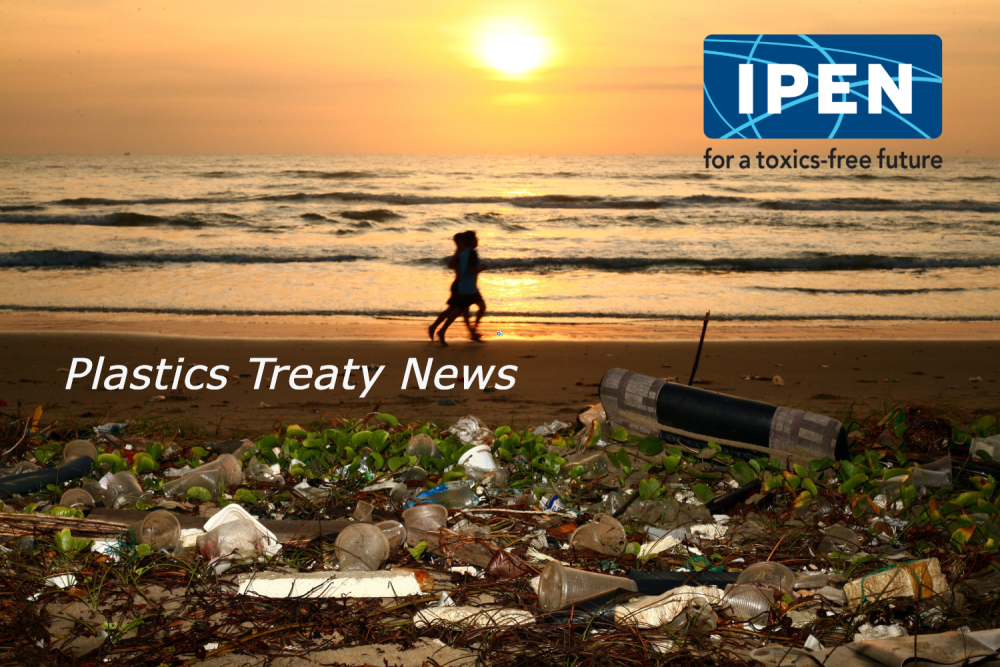Plastics Treaty News - INC-4 Edition
INC-4 edition
See all of our work on toxic plastics at StopPoisonPlastic.org
In anticipation of the Plastics Treaty Fourth Intergovernmental Negotiating Committee (INC-4) in Ottawa, Canada, 23 April to 29 April, IPEN is pleased to share this Plastics Treaty News update.
Key INC-4 Resources
IPEN Quick Views alert delegates to the key issues for INC-4. These and other resources include:
- Quick Views in six languages, which includes an analysis of the revised zero draft, noting language that is important to retain during the upcoming negotiations.
- Plastics FAQ, addressing common questions about the science of plastics and its lifecycle, chemicals of concern, and common arguments, terms, and myths about the Plastics Treaty.
- Troubling Toxics brief, detailing potential approaches to establish criteria for a negative list of chemicals to eliminate from plastics.
- An Introduction to Plastics and Toxic Chemicals, IPEN's comprehensive report on threats to health and the environment from chemicals in plastic (English and Spanish).
You can find other IPEN reports, briefs, and resources on plastics and toxic chemicals at stoppoisonplastic.org.
The Arctic's Plastic Crisis: Threats to Health, Human Rights, and Indigenous Lands
A new report from Alaska Community Action on Toxics and IPEN highlights voices from Arctic Indigenous leaders and synthesizes the science on the plastic, chemical, and climate crises unfolding in the Arctic.
Within a single lifetime, Indigenous communities in the Arctic have seen the rates of severe illness skyrocket due to uncontrolled toxic pollution caused by the interlinking chemicals, plastics, and climate crises. From respiratory disease, to cancer, to reproductive disorders and many others—every part of the body is at risk.
Watch videos and listen to audios with testimonies from Native Alaskan leaders describing the impacts on their lands and cultures.
"We are overwhelmed with concern about the health harms associated with climate change, the loss of sea ice and melting permafrost, and the mobilization of chemicals and plastics—these are all interconnected. We are running out of time!”
Delbert Pungowiyi, Yupik Elder, Arctic Indigenous leader, and human rights advocate from Sivuqaq, Alaska
Read the report, summary, and press release here.
Latest Science Shows Plastic Chemicals Harm Children's Health
The Endocrine Society and IPEN provide a comprehensive update on the state of the science around endocrine disrupting chemicals (EDCs), with increasing evidence that this large group of toxic substances may be implicated in rising global health concerns like infertility, diabetes, immune deficiencies, and other serious conditions. EDCs may be especially harmful during periods of vulnerabiliy like the fetal and infance stages. The report includes a special feature highlighting EDCs throughout the plastics lifecycle. Read the report here.
Project TENDR, an alliance of more than 50 scientists, health professionals, and advocates, released a briefing for delegates on protecting children's brain development from toxic plastic chemicals. Read the briefing and policy recommendations here.
Download the reports "Endocrine Disrupting Chemicals: Threats to Human Health" and "Protecting the Developing Brains of Children from Plastics and Toxic Chemicals in Plastic."
No Debate: Recycling is a Toxic Failure
Reports continue to show that plastic recycling spreads toxic chemicals that harm human health and the environment.
Less than 10% of plastics are recycled, but even if efficiency was boosted, research shows that toxic chemicals are transferred and created throughout the recycling process--harming workers and consumers:
- Toxic chemicals within the original plastic materials transfer into recycled plastics.
- Plastics sorb contaminants during use (e.g., pesticide containers), which are also mixed into the recycled plastcs.
- The process of recycling can cause chemical reactions that create new toxic chemicals.
These recycled plastics then go on to become new products--exposing consumers to a toxic soup of chemicals, including pesticides and pharmaceuticals. A study on children's toys made from recycled plastics found that young children could be exposed to highly toxic chemicals in amounts exceeding EU safety standards, and these chemicals could hamper neurological development and thyroid function.
Chemical recycling, which the plastics industry has touted as "advanced recycling" that will mitigate the current problems with recycling, is also problematic. There is no evidence that chemical recycling can economically or effectively recycle mixed plastic, and the facilities release toxic emissions, produce hazardous waste, and are prone to fires and explosions.
The science is clear that recycling will not solve the plastics crisis and will only distract from creating an effective, protective Plastics Treaty.
Read more in the IPEN reports "Hundreds of Toxic Chemicals Present in Recycled Plastic Pellets", “Children’s Toys or Hazardous Waste?” and the IPEN/Beyond Plastics report “Chemical Recycling: A Dangerous Deception.”
State of the Science on Plastic Chemicals for Evidence-based Policy
PlastChem launched a comprehensive report and database on the more the 16,000 chemicals used in plastics--summarizing their science, hazards, uses, production volumes, and regulatory statuses. The project also reveals troubling information gaps--many chemicals lacked basic identifying information and hazard data.
View the full report and recommendations for policymakers here.

